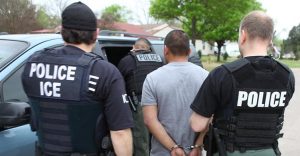
The House on Thursday passed legislation introduced by U.S. Rep. Barbara Comstock (R-VA) to give law enforcement the tools they need to protect Americans from violent street gangs, a measure that drew support from U.S. Reps. Dan Donovan (R-NY) and Diane Black (R-TN).
Federal authorities have determined that the majority of members of violent transnational gangs, such as MS-13, are foreign-born nationals. However, currently gang members can’t be deported until they are convicted of an independent crime.
The Criminal Alien Gang Member Removal Act would allow immigration authorities to bar criminal gang members from coming to the United States. Those criminal gang members in the United States illegally could be detained and removed from the country if they are criminal gang members or participate in violent gang activity.
“This legislation identifies gang membership and participation in gang activity as grounds for inadmissibility and removability from the country,” Comstock said. “In Northern Virginia there have been at least eight brutal murders tied to the transnational MS-13 gang since last November,” she added.
The Department of Justice says the majority of members in MS-13 are from Central America. The group is estimated to have 10,000 members throughout the United States.
Comstock cited the Northern Virginia Regional Gang Task Force’s estimates that up to 4,000 MS-13 gang members are in the Northern Virginia region. “This legislation will make our communities safer by helping to rid gang members from our communities,” she said.
Under the bill, the Department of Homeland Security, working with the Department of Justice, could designate a group as a criminal gang if the group engaged in violent crime, drug felonies, human trafficking, money laundering or other crimes. The bill also ensures that criminal alien gang members are not eligible for immigration benefits, including asylum.
“I’ve seen the tragic consequences of gang violence during my 20 years as a prosecutor and now in Congress,” Donovan said. “Violent criminal gang members should not be walking the streets, but it adds insult to injury when they never should have been in our country in the first place.”
Black said the legislation sends the message that the United States will not tolerate innocent members of communities being victimized by gangs.
“We have heard far too many stories of sons and daughters being murdered or assaulted due to violence by gang members in this country illegally,” Black said.
“It is appalling that people bringing violence into our country are given immunity from deportation unless they are convicted of a separate crime,” Black added.
Comstock, meanwhile, is also working to advance another piece of public safety legislation. She has also introduced the Project Safe Neighborhoods Grant Program Authorization Act, H.R. 3249. That bill would create a $70 million per year grant program to provide resources to state and local entities to thwart gang violence.
“Twenty percent of the authorized $70 million will go directly to already-established gang task forces, like the Northern Virginia Regional Gang Task Force, who are experiencing elevated transnational gang activity from gangs such as MS-13,” Comstock explained.



